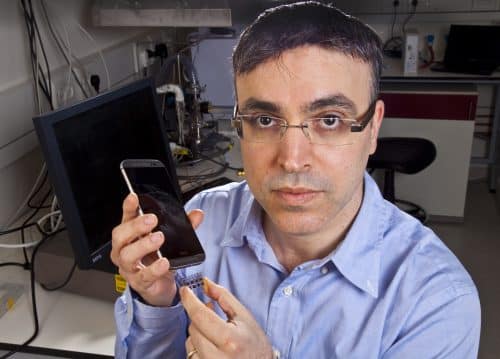In addition, Prof. Haik was selected for the list of the hundred most influential people in the world published by the American magazine GOOD

At the end of the week, Prof. Hussam Hayek of the Technion received the Humboldt Research Award, granted by the Humboldt Foundation in Germany. The award is given to outstanding researchers who have made a significant impact in their research fields, provided that they maintain some sort of collaboration with research institutes in Germany. It is given on the entirety of the researcher's work - discoveries, theories and insights.
Prof. Haik, a faculty member in the Faculty of Chemical Engineering and a member of the Russell Berry Institute for Nanotechnology at the Technion, received the award for his enormous contribution to the diagnosis of diseases using innovative markers that he discovered as part of his research at the Technion. These are markers that appear in the oral cavity and on the skin.
At the same time as the announcement of the awarding of the Humboldt Prize for research, Prof. Haik was included in the list of the 37 most influential people in the world, published this week by GOOD magazine published in Los Angeles. The list includes people from XNUMX countries, who contribute to the well-being of humanity in various aspects including science, education and business. The common denominator for all of them, according to the editors of the list, is that they are personalities who "drive change and refuse to accept the existing reality as the end of a verse." None of the hundred people we have chosen is acting out of lust for fame - and that is precisely why it is important to recognize their actions."
Prof. Hussam Haik completed a doctorate in the field of energy and only then moved to the field of biomedical technology. According to him, "Precisely thanks to the fact that I am not a doctor, I was able to think of such a unique development - a cheap and non-invasive system for diagnosing diseases based on the oral cavity. Inspired by the dogs, who know how to identify a patient but not report to a person what his illness is, I developed this digital system that accurately diagnoses the illness and its stage of development. Today we are working to advance the system in several aspects, including the diagnosis of additional diseases and an interface that connects it to a smartphone."

4 תגובות
John Kerry's father became a Christian by choice in 1944.
The European Union pays a very serious scholarship every year and Teva is invested in it. Hussam's article on connecting gold wires as nano contacts was even the most cited in one of the last years 2014-2015 on nano and semiconductor topics.
In my estimation, more than 10 doctors from around the world are paid at Professor Haik's. Announcements have been made about the ability to detect different types of cancer. And the na-nose feeding company was established. and received a medal for Alexander Humboldt.
How much prestige will he have to achieve before we say well done. The beauty is that some of the most enlightened people in the country are here, arguing for the theory of evolution and for the big bang. When we were minority Jews in Europe, and we brought honor, it hurt us that they were ashamed of us: Heinrich Hertz became a Christian, Gustav Mahler became a Christian, John Kerry became a Christian by choice, Einstein immigrated to the USA, and with him a chain of Jewish German scientists: Leo Szilard, and there were physicists of German and Czech origin: Edward Teller, Richard Feynman but second generation in the USA. Disraeli became a Christian. Christianity was a condition in some cases.
Cancer research is progressing, revolutionary drugs are coming to the market and in the meantime Professor Haik is winning awards every year and we still haven't seen a nano nose, an electronic nose, etc..
This article will remain orphaned because it may cause embarrassment to many. If we had changed the name to Professor Ada Yonat or Dan Shechtman, we would have had no problem saying well done.